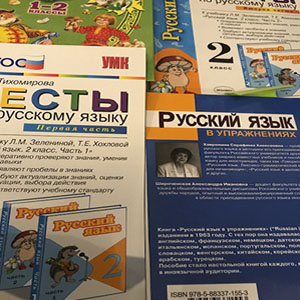25 years ago…
The enormous comparative table over several pages entitled The Present Perfect Vs The Past Indefinite Tense that I, as a beginning teacher, had to learn by heart in order to impress my students (I can still quote some parts of it, when necessary), is firmly associated in my brain with the sickly smell of burned cabbage that came every morning from the ground floor canteen of the College of Foreign Languages in Moscow, named after Maurice Thorez at the beginning of the 90s.
The first class started at 8 am, and as a young teacher I had the first class every day. I ran to work through the deep snow of the badly cleaned Moscow streets in the 90-s, trying to be on time, learning on the way that very table, along with various other things, and trying to predict what tricky questions I would be asked by my students (future interpreters), which words I still needed to learn, and what to do if they asked what some English word meant and I didn’t know it. That cabbage smell from the canteen forever accompanied my worry and excitement at the fact that I really liked my job and that I was a real fully-fledged university lecturer.
… and now
Once, many years later, talking to a British businessman who studied Russian at the Moscow College of Foreign Languages in the 90s, I asked which memories of Russia were the best ones for him, and if there were any places to which he would like to return. To my enormous surprise, he said: “Do you remember the awful smell of the cabbage from the canteen? I want to return there!”
He was joking, of course. As for me – I would indeed love to return there, but this time armed with an iPhone and iPad, with all possible dictionaries and apps loaded into it, with a folder of audio files and a hope that the mobile signal would not let me down and the Internet would give me all the coveted answers instantly. How different everything would have been! One swipe of your finger – and here it is, the unknown word, with translation and illustrations. And any tricky questions can be easily answered!
At the beginning of my teaching career I could not even dream (I would simply not have had enough imagination!) of the incredible possibilities in language teaching that would be brought about by modern technology 20 years later. In those days, I typed exercises for my students using carbon paper to create 3 or 4 copies; each copy was worth its weight in gold, and was given out with strict instructions to return it to the teacher intact. Under my teacher’s desk there was a crib-sheet with the vocabulary from the “home reading” – in case somebody asked what some word meant, and I didn’t remember it… And once, having given up in despair on my chances to find the answer to the question “What is the correct form –“How many police” or “How much police were at the scene of the crime?”, I went all the way to the Central Post Office in Tverskaya Street to call a friend of mine in the US, who was an English teacher. Direct calls abroad from home were impossible at that time, and a phone conversation had to be booked in advance via the operator at a post office. Luckily, I reached my friend Phyllis on the phone and she saved me by telling me the correct answer and even explaining the rule to me. Needless to say, I remembered this rule for the rest of my life!
However, this is all our Soviet past – the time and place where foreign languages were studied as a pure academic subject, theoretically. We lived behind the Iron Curtain and meeting a real live native speaker of English was a science fiction scenario. But what is going on in language teaching now? And what should we expect in the future?
Huge breakthroughs in technology
Our generation, born in the 60s, is absolutely unique in the sense that in our lifetime we have witnessed an incredible and unprecedented leap in the development of modern technology. We have come from the world where computers simply did not exist and even a landline was a luxury, into a world where practically the whole population is using the global computer network… From the world where a book was the only source of knowledge, to the world where the required information can be found on your phone in seconds. From “blind” texts typed on a typewriter with several sheets of carbon copying paper (young people wouldn’t even know what that is!) to text and multimedia files being transferred in no time to any distance.
I recently conducted Russian lessons in the office of a law firm in London, where one half of the group was sitting in front of me “in the flesh” and the other half was in their office in Paris, and we saw each other on a huge screen. At first there was this strange feeling that we were all in some sci-fi movie, but then we got used to it and even did the exercises in turns from left to right as if we were all sitting at one table. The students who were present “for real” joked that those who would not do their homework would be switched off next time!
Language learning resources are vast
We can now do tuition on Skype, Facetime, via video conference calls. We can do tests and listen to lectures from a distance. We can choose all possible materials for language practice and homework according to our taste, and only a lazy person would fail to find what “the doctor ordered”. The material for listening practice is limitless: all registers of speech, all accents and dialects, all genres of literature and music are available online. The spelling is checked automatically, with the help of spell checkers, so modern students do not have to learn by heart the spelling of thousands of words in English – a language famous for its difficult and unpredictable orthography. In addition, one can study a language on one’s own, with the help of self study computer packages, websites and apps. Learning languages is no more the privilege of high brow intellectuals, it is often a necessity now, and everyone has access to a vast collection of materials and resources. It’s a linguist’s paradise, really!
Do people nowadays speak and learn foreign languages better?
But does it mean that more and more people in the world start speaking foreign languages, because learning has become easier and takes less time? Does it mean that the old tested methods are replaced by new, more interesting and advanced ones?
Yes and no. It is true that a larger number of people get acquainted with foreign languages and cultures (it’s an epoch of globalisation and cheap air travel, after all!), but this does not mean that they master these languages at the level of a competent and literate user. How many people have learned a new language with the help of modern technology alone? I haven’t seen any! Everyone who speaks a foreign language to a certain extent, have studied it with teachers’ help. Even in the Netherlands (the land of brilliant linguists!) where, for one thing, English language films are not translated into their mother tongue, so that children and young people could “absorb” English as a second language, no one doubts the value of traditional English language lessons in schools.
If modern technologies could by themselves successfully teach languages, then English native speakers, who have access to the most advanced technologies, would be the best linguists in the world. However, as we all know, this is far from being true. One of the reasons is of course that the whole world now speaks English, especially in the sphere of business and computer technologies, so English native speakers simply do not have any practical necessity to learn foreign languages. For them, it’s a voluntary preoccupation, often a labour of love, a hobby.
But even those who do have such necessity (because they live and work abroad, or have foreign relatives/friends or a romantic interest), according to my observation, do not excel in learning languages using the newest internet/computer methods. On the one hand, many of them are not natural linguists. But the problem is that, being non-linguists, they use teaching packages randomly and without a system, with large time gaps, completely forgetting what they learned last week or last year. Listening to some people’s complaints about their inability to start speaking Russian, I often think: “What you need is a good professional teacher who would present a language as a clear system to you, and will make you learn the right stuff regularly “from there to there”, to get you off the ground!”
What modern technologies cannot replace
In our modern computerised world there are some things that remain unchanged in language teaching: the general methodology, the professional presentation of the material to be learned, a systematic approach, meticulous preparation of the teacher before every lesson, an individual approach to every student, good humour and the teacher’s charisma, which is incredibly important. Those things have always been the basis of successful teaching.
However, the “accessories” of teaching have changed – the format of the classes, the variety of home assignments, the means of conveying information, and perhaps its perception. Our students do not have to make any notes by hand, sit in the libraries for hours, spend whole days in search of resources for their course works and essays. Any information is easily available in huge quantities. However, there is one important BUT here: not all information available on the World Wide Web is trustworthy, correct and reliable. And here to our rescue comes the teacher, who, just as before, supervises and directs the learner, sets the volume of work to be done and controls its quality.
Will we need language teachers in the future?
Those who say that the role of a foreign language teacher will be diminished or will die altogether in the future, are completely wrong. After all, everyone is the same for a computer, but a teacher knows what every individual learner needs. A good teacher motivates and disciplines, brings knowledge into a system, selects and creates study materials, pushes you (in the friendliest possible way!) to achieve a result. A computer doesn’t care if someone actually learns The Genitive Case and uses it correctly, whereas I, the teacher, do care. I am keen for my students to learn and achieve concrete results, because I invest my time, my knowledge, my energy into them, so I want to see the return on my investment! I hugely appreciate the fact that they voluntarily, in their personal spare time, come to me to learn a language, so I will use their time to their best advantage.
Modern technology in our era of globalisation is not a panacea, but a valuable assistant, a powerful instrument in our hands. We should just use it skilfully, combining those very old (learned in the last century!) grammar tables, with live and contemporary examples from the world’s global resources. We should do our best to keep up with the modern world and teach our students to make the best of its great advantages!




